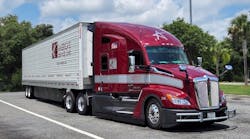The Senate last night passed an energy bill that will require fuel efficiency of cars and light trucks to average 35 miles per gallon by 2020. It passed after a vote for a stronger bill that included long-term tax credits to support renewable energy and required 15% of electricity production to be from renewable sources failed by one vote earlier in the day.
The revised version of the energy bill passed by an 86-8 vote and President Bush is expected to sign it. He had threatened to veto the bill before the tax incentive portion was removed. Support for the original version was split heavily along party lines, with Democrats approving and Republicans opposed, before the compromised version was passed.
The original bill passed the House by a vote of 235-181, also along party lines, before the 59-40 vote in the Senate on Thursday. If the bill is signed into law, fuel efficiency requirements will begin to increase in 2011, with medium- and heavy-duty trucks affected by 2016, according to the Detroit News.
While numerous environmental and governmental groups have argued that the bill does not go far enough after the removal of the tax credits, most agree that it is a good start in attacking energy issues and they will continue to push further legislation regarding the tax incentives.
“This bill is a positive step,” Ann Wilson, senior vp for government affairs of the Motor and Equipment Manufacturers Association (MEMA), told Fleet Owner. “We would support other attempts to address the tax and incentive issues that will be necessary to accomplish the legislative objectives.”
Although Wilson admitted “there are some really good things in here for the supplier community,” the tax incentives are something MEMA will continue to fight for. “We believe it’s really important that there are incentives for research and development of these vehicles and the purchase of these vehicles,” she said.
While Wilson said that there are many challenges for auto manufacturers in the bill, she pointed out that “Many auto manufacturers support the bill, because it’s better to know where they’re going, rather than worrying for the next year and a half.”
Senator Barbara Boxer, D-CA, one of the biggest supporters of the original bill, said of the decision: “While it should have been a better and stronger bill with tax breaks for renewable energy and a requirement for electric utilities to use more solar, wind and geothermal energy, it is still a good first step toward a cleaner future for America.”
The bill was supported by the United Auto Workers, which said it contains key features they strongly support while including safeguards for U.S. auto manufacturing jobs. “The UAW strongly supports this historic bill, which contains aggressive but still achievable fuel economy requirements,” said UAW president Ron Gettelfinger. “It will help consumers and the environment, and at the same time protect U.S. jobs.”
Environmentalists still hope to pass a tax incentive bill to promote renewable energy. "America’s solar industry remains undeterred,” Solar Energies Industries Association president Rhone Resch said in a statement. “SEIA will continue to pursue a long-term extension of the solar investment tax credits (ITC) with increased intensity. We will work with our champions in Congress to ensure passage of long-term tax incentives that strengthen America’s energy security, create hundreds of thousands of U.S. jobs, and provide a key solution to climate change."




